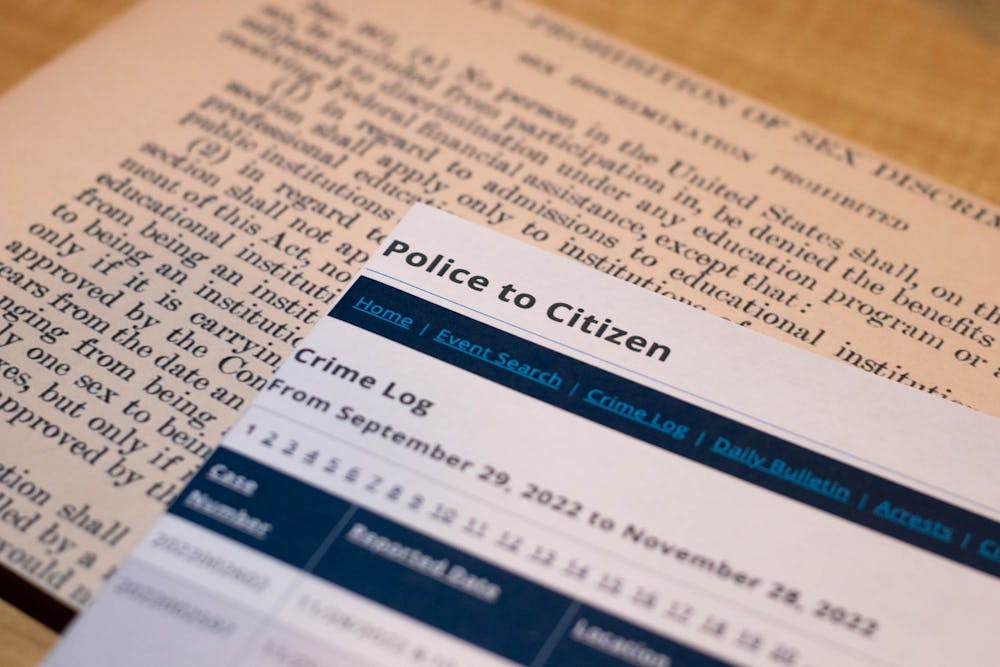Reported cases of rape and sexual assault are subject to The Clery Act, a consumer protection law that requires all colleges and universities to report campus crimes and data.
The law also requires universities to disclose policies and procedures they have put in place to improve campus security and support victims of violence in any capacity they can.
UNC is required by the Act to keep a log of crimes that have happened on campus. They are not required to alert the community when a serious incident like sexual assault happens, unless the situation poses a "serious or continuing threat to the campus community," according to the UNC Police website.
To stay up to date on daily reported crimes on campus, individuals must manually check the UNC Police crime log. The log describes incidents as they are first reported to University police, but the description column in the log does not reflect the conclusion of a police investigation.
The crime log states that, on Nov. 14, there was an incident of “Clery rape." Students were not formally alerted. It is the most recent incident subject to the Clery Act reported at the time of publication.
Senior Esmé Kerr said they wish there was more awareness being raised about the problem of sexual assault on campus.
The lack of concern and community urgency surrounding the topic is unacceptable, said Kerr.
“From day to day, I feel really safe on campus, but that's because I do. Ignore it, right?” she said. “When I can ignore it, I do ignore it because it is something that is really emotionally heavy for me.”
Kerr said that they recently had a change of heart and realized that this topic is not something that can be ignored because it affects everyone.
Community reaction
Kathleen Fitzgerald, an associate professor in the sociology department, has experience teaching about sexual assault awareness and prevention. She said her students feel like University leaders are not doing enough for students.
“Some of the things students are furious about are little things the University could fix, like letting us know when an assault happens," Fitzgerald said.
To get the day's news and headlines in your inbox each morning, sign up for our email newsletters.
She suggested there could be more alerts when serious crimes like these happen, so that students are aware of what is going on at the University.
"We rarely get those messages," Fitzgerald said. ”What is that message from October 22 telling you? It kind of tells you there are no other sexual assaults, just that one, because that’s the one they told us about.”
The recent incidents have shaken students on campus.
One student — who wished to remain anonymous — was assaulted during their time at UNC. Hearing about other instances of sexual violence and little action being taken makes them feel very unsafe on campus, they said.
“Not really being provided a lot of information about the incidents also creates a lot of unease for me and a lot of my peers,” they said.
They said they wished the University provided more details to students surrounding the incidents, like specifically when and where the incidents happen so students could be more aware.
Resources and support
-
Gender Violence Services Coordinators (GVSCs) provides confidential support for UNC students, faculty, and staff of all gender identities. GVSCs can provide emotional support, help with needs and considerations related to safety planning, and explore options for support and reporting. Confidential appointments are currently available by phone or secure video chat. Contact: gvsc@unc.edu or 919-962-1343.
-
Equal Opportunity and Compliance Office oversees the University’s Policy on Prohibited Discrimination, Harassment, and Related Misconduct as well as the investigation and adjudication process for the prohibited conduct. Report and Response Coordinators are available by phone or video chat to explore support and reporting options and to help connect members of the Carolina community with campus and community resources. Contact: reportandresponse@unc.edu or 919-445-2759.
-
University Ombuds Office serves as a confidential, impartial, and informal resource for students and employees. The Ombuds Office is available to listen, help identify and evaluate options, and offer referrals to other resources. Contact: ombuds@unc.edu or 919-843-8204.
-
Counseling and Psychological Services at 919-966-3658 to schedule a confidential telehealth appointment.
@zoefrederick12
university@dailytarheel.com




